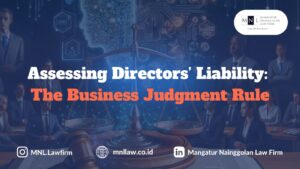
Assessing Directors’ Liability: The Business Judgment Rule
The Board of Directors constitutes a corporate organ of a Limited Liability Company (Perseroan Terbatas/LLC) that bears fiduciary duties in managing the corporation, both in judicial and non-judicial matters. In the event that the Board of Directors commits a mismanagement act (misfeasance), the concerned director may be held personally liable for any resulting corporate losses. However, does every instance of corporate loss automatically constitute a director’s fault that warrants personal liability? The answer is no. A director cannot be held personally liable as long as their actions fall within the ambit of the Business Judgment Rule (BJR).
What is the Business Judgment Rule?
Black’s Law Dictionary defines the Business Judgment Rule as “a presumption that in making business decisions not involving self-interest or self-dealing, corporate directors act on an informed basis, in good faith, and in the honest belief that their actions are in the corporation’s best interest.”
In practical terms, the Business Judgment Rule refers to decisions made by directors that are not driven by personal gain but are made honestly and in the best interests of the corporation. The BJR is a legal doctrine that grants directors a shield from liability, provided that their business decisions are made in good faith, free from conflicts of interest, and with due regard for the corporation’s welfare.
Legal Basis for the Business Judgment Rule
The Indonesian Company Law (Law No. 40 of 2007 concerning Limited Liability Companies, hereinafter “Company Law”) does not explicitly regulate the Business Judgment Rule. Nonetheless, the principle is implicitly embodied in Article 97 paragraph (5) of the Company Law, which stipulates that a director shall not be held personally liable for corporate losses if they can prove that:
a. The loss was not caused by their fault (culpa) or negligence (negligent act);
b. They acted in good faith and with due care in the best interest of the company;
c. There was no conflict of interest, either directly or indirectly, in the relevant management action; and
d. They took appropriate steps to prevent or mitigate the loss.
Limitations on the Protection of the Business Judgment Rule
The protection afforded by the BJR is predicated on the directors’ obligation to act in good faith and with accountabilityin the performance of their duties. This aligns with Article 97 paragraph (2) of the Company Law, which provides:
“Each member of the board of directors shall perform their duties in good faith and with full responsibility.”
By a contrario interpretation, this obligation prohibits corporate directors from engaging in fraudulent conduct (fraud), conflicts of interest, or gross negligence (culpa lata) in carrying out corporate management actions.
In practice, the application and limitations of the BJR are assessed case-by-case (casuistic approach), depending on the specific facts and circumstances of each matter. Judges have the authority to interpret and delineate the boundaries of the BJR in rendering their verdicts.
Conclusion
The Business Judgment Rule affords legal protection to corporate directors in the performance of their managerial functions, as long as those actions are executed in good faith, with prudence, diligence, and in the best interest of the corporation.
Legal Reference
Law No. 40 of 2007 concerning Limited Liability Companies (the “Company Law”)
Author:
Nicko Surya Airlangga, S.H.
Masta Pasaribu
